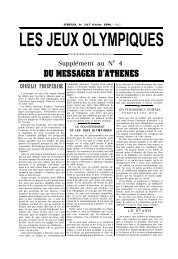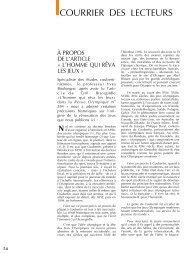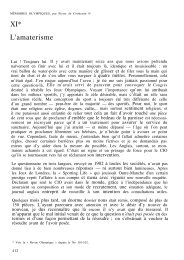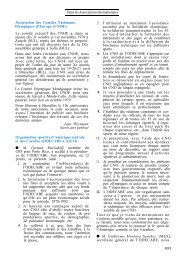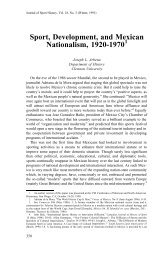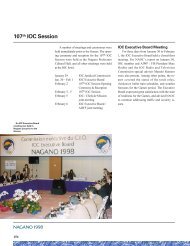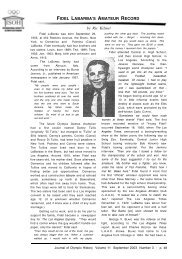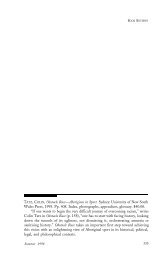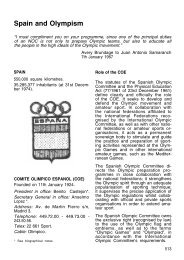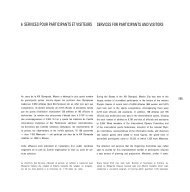Apollon The Emperor of Athletes - LA84 Foundation
Apollon The Emperor of Athletes - LA84 Foundation
Apollon The Emperor of Athletes - LA84 Foundation
Create successful ePaper yourself
Turn your PDF publications into a flip-book with our unique Google optimized e-Paper software.
AUGUST 1997 IRON GAME HISTORY<br />
284 pounds. We can list after him André with 252 pounds and San<br />
Marin with 240 pounds. <strong>The</strong> average is 180.<br />
<strong>The</strong> arm extension is one <strong>of</strong> the most familiar <strong>of</strong> all<br />
strength exercises, but it is also the one which is the easiest to counterfeit.<br />
We have heard it said that <strong>Apollon</strong> had performed an arm<br />
extension <strong>of</strong> one hundred pounds. Obviously, in order to attain<br />
such a figure, he had to cheat, that is to say to rest the greater part<br />
<strong>of</strong> the weight on the forearms in such a way as to minimize the<br />
length <strong>of</strong> leverage. We can list several athletes who do very correct<br />
arm extensions with six pounds.<br />
We cannot end without remarking that whatever may have<br />
been written on this question our strongmen have not grown weaker.<br />
On the contrary, they are stronger today than ever before.<br />
Thanks to gymnastics societies, the progress has been enormous<br />
for the last ten or fifteen years.<br />
If while you were at school, you were a fan <strong>of</strong> gymnastics,<br />
you must remember certain feats which were performed only by<br />
your teacher or by pr<strong>of</strong>essionals in the circus. Today these feats<br />
are performed very easily by a very great number <strong>of</strong> young people.<br />
<strong>The</strong> same is true <strong>of</strong> weightlifting. AU the records that we have<br />
quoted here have only been accomplished in the last fifteen or so<br />
years. –Thomas Grimm<br />
As we can see, already at this time <strong>Apollon</strong> seemed clearly<br />
superior by far than all the athletes named in this article from<br />
<strong>The</strong> Little Journal, but <strong>Apollon</strong>’s strength was never fully known.<br />
No one had ever pressed him to accomplish any feat <strong>of</strong> strength<br />
whatsoever. <strong>The</strong>refore, we cannot evaluate fairly in terms <strong>of</strong> kilos<br />
the athletic feats which he performed nor can we compare him with<br />
today’s athletes because at the time when <strong>Apollon</strong> was at his peak <strong>of</strong><br />
strength there was no Weightlifting Federation that would <strong>of</strong>ficially<br />
register records, no closely monitored method to know if an exercise<br />
was correct or incorrect, neither judge nor dynamometer to<br />
assure the regularity <strong>of</strong> a classic exercise. In addition there was no<br />
decent, graduated and balanced equipment which might permit a barbell<br />
or other weight to be loaded little by little until it reached a lifter’s<br />
maximum weight. It was necessary, by way <strong>of</strong> example, to be very<br />
strong in order to handle three twenty-kilo block weights in the snatch<br />
Quite a few <strong>of</strong> today’s athletes who now snatch 140 or 150 pounds<br />
do so because <strong>of</strong> good equipment and progressive training, but they<br />
could never snatch three twenty-kilo weights unless they had been<br />
faced to do so from the start. <strong>The</strong>y simply would not have the strength<br />
to put the weights up all at once; they would become discouraged and<br />
would completely abandon their ineffectual attempts at the end <strong>of</strong> a<br />
month or two.<br />
I speak from experience in this case, for I am among those<br />
in the latter category. I recall that at twenty-two years <strong>of</strong> age, after I<br />
had worked out since the age <strong>of</strong> fifteen, I struggled ineffectually with<br />
35<br />
a forty-kilo dumbell. Had I never made the effort to have a light thirty-kilo<br />
barbell made expressly for me which I could press easily and<br />
which I was able to make gradually heavier in response to my improving<br />
physique, I would have continued to strain vainly to lift the fortykilo<br />
bell. At the end <strong>of</strong> several months, despite my fervor for athletics,<br />
I would have been discouraged and would never have been<br />
able to lift nearly seventy kilos with one hand. Nor would I be able<br />
to lift sixty-five kilos at the Montmartre Athletic Society <strong>of</strong> Paris in<br />
front <strong>of</strong> the president, Eugene Robert, and seventy members <strong>of</strong> the<br />
club as I did at the age <strong>of</strong> nearly forty. Thanks to good equipment<br />
and progressive weight training, I had thus managed to increase my<br />
maximum from around forty kilos to sixty-five kilos, which is to say<br />
a gain <strong>of</strong> twenty-five kilos.<br />
When at the age <strong>of</strong> eighteen, <strong>Apollon</strong> encountered four<br />
twenty-kilo weights, he lifted them with ridiculous ease. If we therefore<br />
admit that <strong>Apollon</strong> would have gained by knowledgeable training<br />
and good equipment as much as I had, since he had double my<br />
own strength (lifting double what I was able to lift), he would then<br />
have gained fifty kilos over his old maximum, that is 130 kilos. We<br />
can see from this that <strong>Apollon</strong> was born twenty years too early, or<br />
rather our training methods and our modern equipment had arrived<br />
twenty years too late.<br />
<strong>The</strong>re is another very important question which has never<br />
been examined and which conclusively demonstrates <strong>Apollon</strong>’s<br />
extraordinary muscular strength. <strong>The</strong> great athlete had always worked<br />
with his muscles alone. Unlike many strongmen who supplement<br />
their muscular strength by an exaggerated expenditure <strong>of</strong> nerve impulses,<br />
<strong>Apollon</strong> never needed to tap his nervous energy. <strong>The</strong>se people<br />
accomplish their feats with will power rather than with the muscles<br />
<strong>of</strong> their arms. For example, some very energetic athletes (and we<br />
commend them for their energy) only lift their maximum weight once<br />
from time to time, and when they choose not to do so, remain much<br />
below their own records. Example: an athlete <strong>of</strong> this type works<br />
without an audience to urge him on and will hardly lift sixty kilos<br />
in a one-arm press, but his maximum might be sixty-five or sixtyeight<br />
kilos. In nineteen attempts out <strong>of</strong> twenty he will not be able to<br />
reach his maximum, unless he makes a major call on his nervous system,<br />
a situation that would necessarily tire him by the expenditure <strong>of</strong><br />
nervous impulses.<br />
<strong>Apollon</strong>, on the contrary, lifted with his muscles, pressing<br />
his weights to the maximum every day. One could ask him to press<br />
or jerk seventy-two kilos at any time <strong>of</strong> the day: he would do it at once<br />
and without the slightest fatigue. This was pro<strong>of</strong> either that he could<br />
lift a vastly heavier weight or else that he did not need to call upon<br />
his will in order to lift heavy weights; that is the evidence <strong>of</strong> real muscular<br />
power.<br />
Take a hundred strongmen, learn their records, and then ask<br />
them to lift their maximum on the spot. <strong>The</strong>re would be ninety-



